The Numerous Health Benefits of Turmeric
In a hurry? Click here to read the Article Summary...
Have you ever partaken of an Indian or South Asian curry? The reason they are typically yellow in color is because they contain the root spice turmeric. Known scientifically as Curcuma longa, turmeric is found all over South Asia and is believed to have been in use in India as both a spice and as a medicinal component for at least 5000 years.
The many health benefits of turmeric have long been exploited in Ayurveda, the traditional Indian system of medicine. According to customary Ayurvedic practice:
- Turmeric maintains gut flora and protects against stomach disorders. It’s also a natural antiseptic and is useful for disinfecting cuts, burns, wounds, and other skin infections.
- Turmeric detoxes
 the liver. Curcumin (a primary compound of turmeric root) has been found to increase the flow of bile, which is necessary for breaking down dietary fat during digestion.
the liver. Curcumin (a primary compound of turmeric root) has been found to increase the flow of bile, which is necessary for breaking down dietary fat during digestion. - Turmeric can help to manage blood sugar.
- Due to its anti-inflammatory and pain relieving properties, turmeric is used for treating arthritis inflammation and pain.
Traditionally, turmeric is also used to treat cough, tonsillitis, sore throat, swollen gums and canker sores, upper respiratory congestion, dry cough, and asthma.
Turmeric Contains More Than 300 Bioactive Components
But it’s not just traditionalists who value turmeric. According to modern science, the list of turmeric’s health benefits – specifically, of its more than 300 bioactive components known as “curcuminoids,” which exert various beneficial biological actions in our body – is growing by the day.
Thousands of scientific studies have been carried out on curcumin, the main curcuminoid and active ingredient present in turmeric. This research is demonstrating that curcumin has powerful anti-inflammatory and antioxidant properties and is believed to be mainly responsible for many of turmeric’s health benefits.
Why Is Inflammation Bad News for Your Health?
Inflammation has been getting a bad rap in the media recently. Inflammation is our body’s natural response to cellular and tissue damage caused by:
- injury
- harmful external invaders such as bacteria and viruses
- toxic pollutants that enter our bodies via our diet or from the environment
Inflammation starts out as a protective response that works to eliminate the original cause of damage, clear out damaged and dying cells, and begin the process of repair and healing.
Although inflammation is beneficial for our body in the short term, ongoing inflammation is now known to play a major role in almost every chronic disease including:
- diabetes
- heart disease
- Alzheimer’s and other brain degenerative diseases
- cancer
Inflammation and Heart Disease
Inflammatory mechanisms have been linked to the development of atherosclerosis, an early step in the formation of heart disease. Inflammatory mechanisms have also been shown to trigger thrombosis, leading to heart infarcts (attacks) and strokes.
Inflammation and Cancer
Similarly, chronic inflammation is a necessary component for cancer formation and progression. The so-called “tumor microenvironment” – largely controlled by inflammatory cells – plays an active role in the growth, survival, and spread of cancer cells.
The tumor microenvironment is the environment in which the tumor exists and usually includes blood vessels, immune cells such as lymphocytes, inflammatory cells, and various signaling molecules.
Turmeric’s Anti-Inflammatory Activity
Curcumin has a long history of use in Ayurvedic medicine as a treatment for inflammatory conditions. This is supported by scientific research published in Advances in Experimental Medicine and Biology, which shows that curcumin fights inflammation by interacting with and blocking the actions of a number of different molecules that play a role in the inflammatory process.
Results from the Phase IIa Clinical Trial of Curcumin for the Prevention of Colorectal Neoplasia indicate that curcumin is well tolerated, with only mild gastrointestinal disturbances. In other words, turmeric’s health benefits don’t come with a laundry list of side effects, like many mainstream drugs do.
Fighting Free Radicals and Boosting Natural Antioxidants with Turmeric
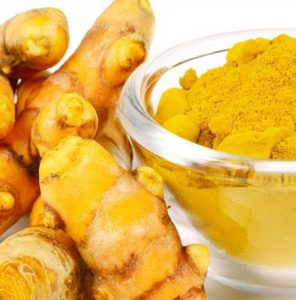 Free radicals are highly reactive chemicals that are formed daily in our bodies as a result of normal biological metabolic activity. However, thanks to the ever-increasing levels of toxic chemical pollution in our environment, we’re now being bombarded with many more free radical attacks than ever before.
Free radicals are highly reactive chemicals that are formed daily in our bodies as a result of normal biological metabolic activity. However, thanks to the ever-increasing levels of toxic chemical pollution in our environment, we’re now being bombarded with many more free radical attacks than ever before.
Free radicals can damage cellular structures including the outer protective cell membrane, cellular proteins, and even DNA – paving the way for chronic diseases such as heart disease, Alzheimer’s, and cancer to develop. Free radical damage is also believed to contribute significantly to the aging process.
According to Advances in Experimental Medicine and Biology, Turmeric contains powerful curcuminoid antioxidants which can neutralize harmful free radicals and minimize the damage they cause in our bodies.
Not only that, but in a 2013 study published in Toxicological & Environmental Chemistry, turmeric was shown to enhance the activity of our body’s natural antioxidant enzymes, including superoxide dismutase (SOD), catalase, and glutathione peroxidase.
SOD helps to break down and inactivate harmful superoxide radicals. Catalase protects our cells from oxidative damage caused by reactive oxygen species (ROS), which are a type of harmful free radical that contains oxygen. Similarly, the main biological role of glutathione peroxidase is to protect our cells from oxidative damage.
In other words, the antioxidant benefits of turmeric include neutralization of free radicals as well as enhancing the activity of natural enzymes in our body that also inactivate them.
Can Turmeric Help Protect Against Many Types of Cancer?

Extensive research indicates that the health benefits of turmeric may include both prevention and treatment of cancer.
In studies, curcumin has been shown to block the proliferation of a wide variety of tumor cells by turning off multiple molecular mechanisms that otherwise allow them to grow uncontrollably.
Some researchers believe curcumin may interfere with up to a hundred different cell signaling pathways – including those of the cell cycle, apoptosis (programmed cell death), proliferation, invasion, angiogenesis (growth of new blood vessels to support tumor growth), metastasis, and inflammation.
Not surprisingly perhaps, curcumin has been reported to have anti-cancer activity against leukemia, melanomas, sarcomas and lymphomas – as well as against gastrointestinal, breast, ovarian, head and neck, and lung cancers.
Evidence also suggests that curcumin may even help to prevent cancer from developing at all. In a 2012 Phase II clinical trial published in the journal Cancer Prevention Research, curcumin was given to 44 smokers daily for 30 days, with 8 of them already showing lesions in the colon that sometimes turn into colorectal cancer.
Of the 41 subjects that completed the study, 4 grams of curcumin given daily reduced the number of lesions by 40%, reducing the likelihood that they will develop colorectal cancer.
How Can You Get Enough Curcumin?
One of the major problems with curcumin is that it’s poorly absorbed in our gut. Also curcumin is fat soluble, but not water soluble. So it’s advisable to consume it in a meal cooked with a high-quality fat source such as extra virgin olive oil or coconut oil.
How Much Curcumin Is in Turmeric?
The curcumin content of turmeric is only around 3% by weight – which is why most studies looking at turmeric’s health benefits use extracts that have been standardized to include large amounts of curcumin, usually at doses of 1 gram per day or even more.
It would be very difficult to consume such a high dose of curcumin every day solely from the turmeric present in curry dishes. To help take advantage of the many diverse health benefits being credited to turmeric, you may wish to consume a proven, reliable extract containing significant amounts of curcumin that is more available to your body.
Turmeric 3D from Organixx provides you one of the most “bioavailable” forms of turmeric due to its unique fermentation process. This means your body experiences the maximum benefits of the purest, most potent turmeric available!
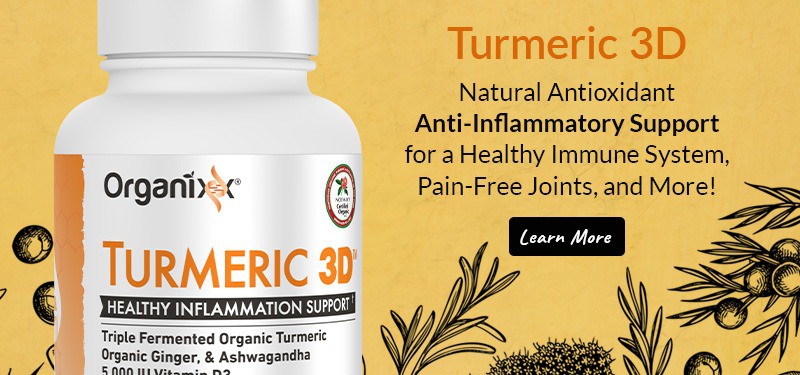
 Sources:
Sources:
Article Summary
Turmeric is a long-time staple of the ancient Indian healing system of Ayurveda.
Curcumin, the main active ingredient in turmeric, helps fight inflammation, which is known to play a major role in almost every chronic disease.
Turmeric contains antioxidants which can neutralize harmful free radicals and minimize the damage they cause in our bodies.
Evidence suggests that curcumin may help to prevent cancer from developing.

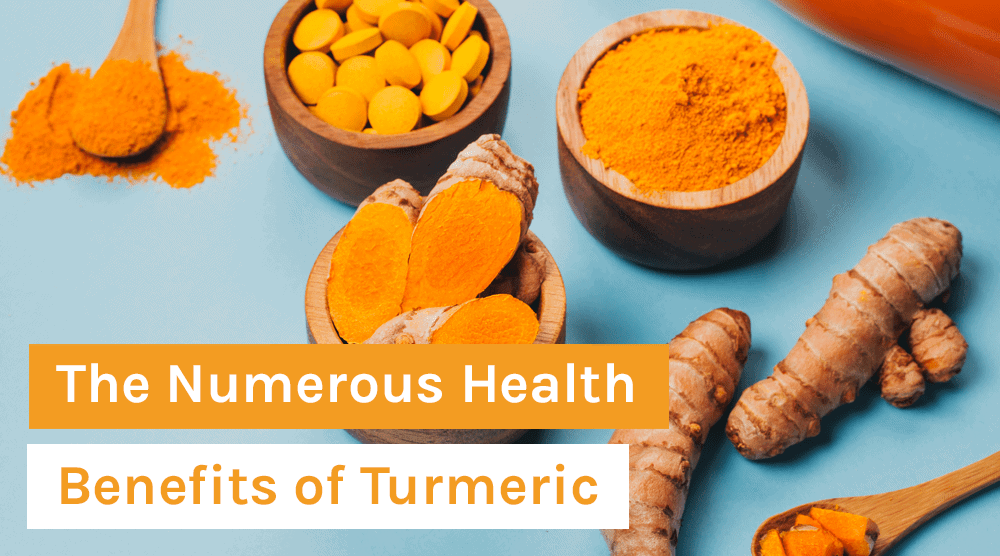
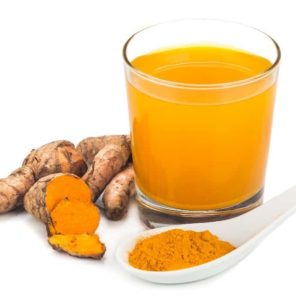 the liver
the liver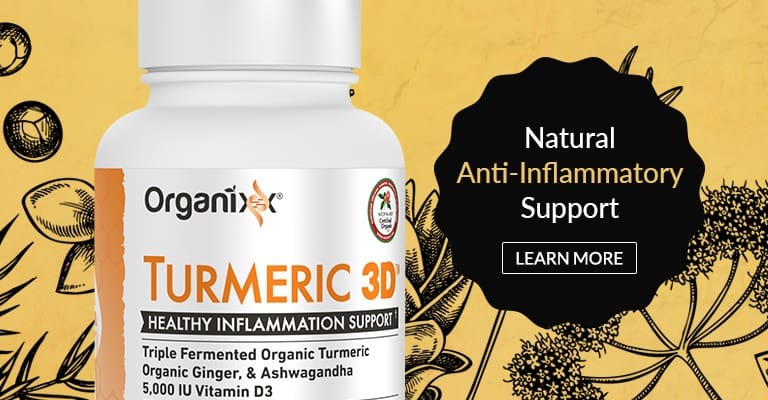
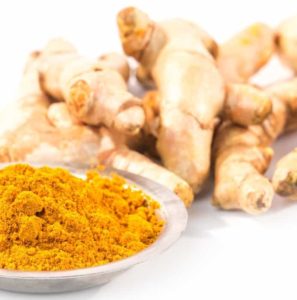
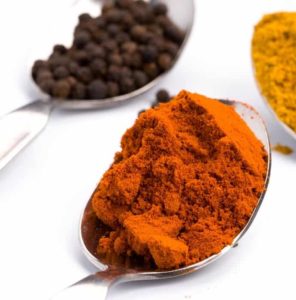


Does it thin your blood?
Hi Doris,
Turmeric has been known to prevent clotting and thin the blood. In this case we always suggest you speak with your doctor before starting or stopping any supplement. Especially if you are on any medication or have health concerns. Wishing you a happy and healthy day! :)
what is the recommended time to consume it? with what food is recommended for better absortion? will disrupt the sleep if consume at dinner ?
my name is Dodou Bojang. I am here differing here
Hello Doug,
Thank you for being here with us. Welcome!
Have a great day!
Do you have turmeric without 3D?
Yes we do, Gladys.
Our Magi-Complexx is made from a revolutionary formula that combines Frankincense, Myrrh & organic fermented Turmeric into a powerhouse anti-inflammatory supplement.
Magi-Complexx comes in capsules and an essential oil blend. You may learn more about them here:
Capsules- https://shop.organixx.com/products/magi-complexx-capsules
Essential Oil- https://shop.organixx.com/products/magi-complexx-essentials-oils
We would love to hear what you think. We appreciate your interest in Organixx!
Some time ago I ordered your Turmeric essential oil and I was wondering if I could ingest it. And is this 100 pure theraputic oil.
Hi Beatrice, thank you for your question.
All of the Organixx Essential Oils are 100% pure/uncut with no bases or any additives. This means that there are no preservatives or fillers in any of our essential oils.
With this, please know that essential oils are meant to be diffused in water or added to oil. Direct application to skin may cause irritation. Please consult a physician or specialist before consuming essential oils.
Some essential oils can be taken internally, and others should not. Please consult a qualified nutritionist, physician or holistic health practitioner before consuming essential oils. Please note some oils should NEVER be taken internally, including anise, fennel, hyssop, pine, cypress, arborvitae, birch, cedarwood, eucalyptus, white fir, tea tree, and wintergreen.
Please also make sure to check the Best By Date of the essential oil you have at hand. It is our recommendation to utilize our products up to one (1) year beyond the “best by” date as the nutrient value of the product remains viable and usable.
We hope this helps.
Thank you and we wish you a wonderful weekend!